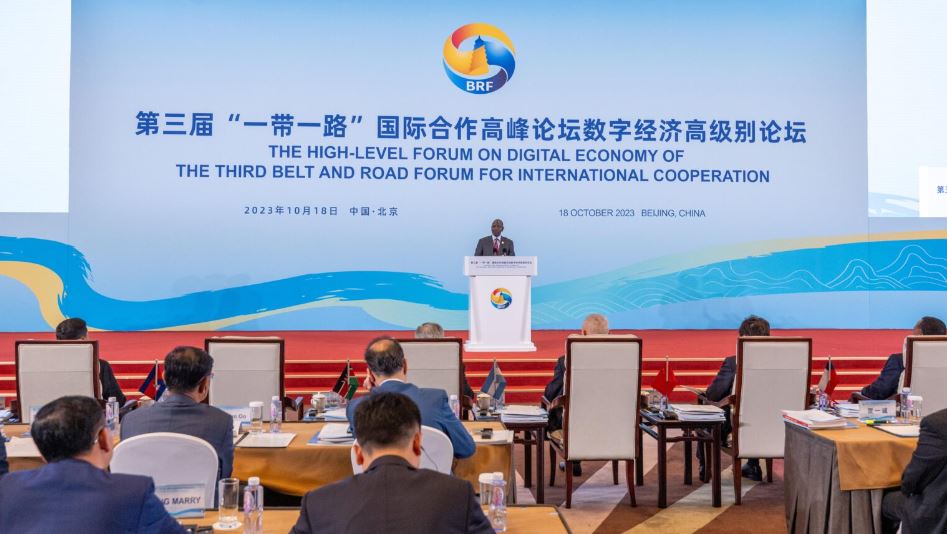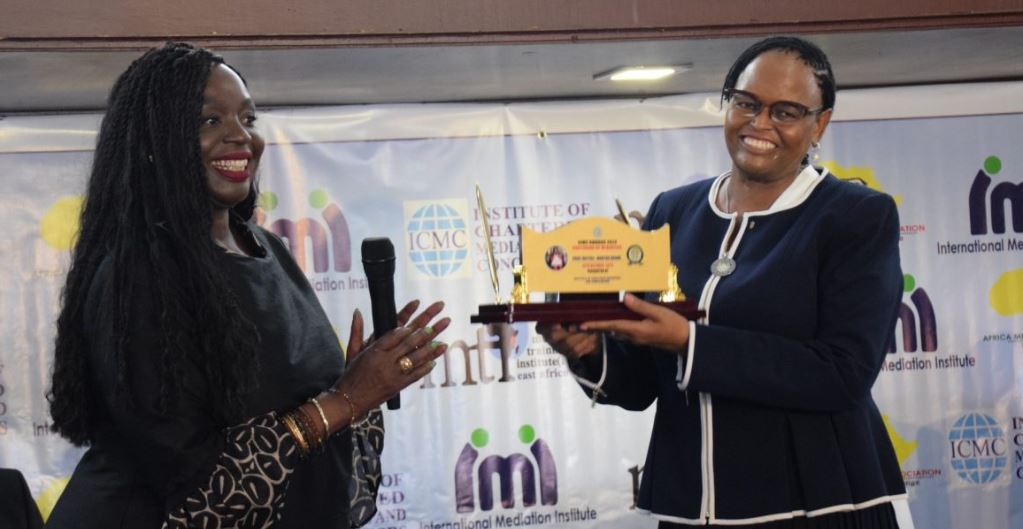 Heads of State and governments,
Heads of State and governments,
Esteemed members of the Diplomatic Corps,
Distinguished Delegates
Ladies and Gentlemen;
- I will use this first opportunity to express my gratitude to the government of the People’s Republic of China for inviting us to take part in the 3rd Belt and Road High-Level Forum. I thank His Excellency, President Xi Jinping, on behalf of the people and nation of China, for the wonderful reception accorded to us since our arrival. This event is special in several fundamentally significant ways. The leadership of President Jinping, the emergence of a China that is able, ready and willing to champion and act as a force of good throughout the world.
- Secondly, as we celebrate a decade of transformative partnership, which has united us in this historic development partnership founded on connectivity laid by the Belt and Road Initiative, and transitioning into the global development initiative, a flourishing alliance mobilised to deliver sustainable and transformative solutions to the most urgent infrastructure and development challenges of our time.
- GDI actualises the aspirations behind the intensive investment in connectivity, demonstrating the power of infrastructural capital to support rapid socioeconomic and industrial growth and to facilitate innovative, knowledge-based enterprise and governance, driven by information and communication technology.
- Thirdly, this year, Kenya commemorates six decades of self-rule and, at the same time, celebrates sixty years of warm, deep and dynamic friendship with the People’s Republic of China. This friendship has lasted from the difficult days of our liberation struggle, and the early days of independence, all the way to the present era of rapid socioeconomic development.
- This is therefore a unique opportunity to bear witness to, appreciate and celebrate the profound positive impact of true friendship on the destiny of a nation and its people. This friendship is what makes Kenya a key participant in the BRI and the GDI.
- Kenya is presently embarked on a bottom-up economic transformation agenda aimed at intensifying strategic investment in priority sectors that will simultaneously reduce poverty, provide universal health coverage, feed millions of people, increase incomes, create millions of jobs annually, accelerate industrialisation, promote micro, small, medium-sized enterprises and boost Kenya’s export competitiveness, over the next decade.
- It is important to note that BRI investments in Kenya include an expanded and improved road network, the standard-gauge railway (SGR), air and sea port projects. These projects have transformed connectivity within our country by making greater productivity and efficiency possible. They have also transformed Kenya’s connectivity regionally, facilitating cross-border trade and regional integration.
- I believe it is also important to point out a little-remarked benefit of infrastructural connectivity: it improves security significantly, enabling individuals, households, communities and enterprises to secure lives, property and livelihoods.
- Kenya’s overarching national development blueprint, Vision2030, Africa’s Agenda 2063 and China’s GDI are all aligned with global developmental initiatives and, especially, conducive to the attainment of sustainable development goals. The reason is that sustainable transformation must proceed from a robust infrastructural foundation, and the BRI established it. Yet even as we appreciate the successful outcomes of the BRI investments, we must pay attention to another transformation which has emerged and rapidly established itself as the most powerful social, economic, political and cultural force of our time: the ICT revolution and the digital economy.
- A notable and deeply worrying feature of the advent of the digital era was the seemingly unstoppable emergence and widening of the digital divide, which separated the highly industrialised wealthy economies, which could afford the capital needed for infrastructures, research and development and investment in a new sector, from their less developed counterparts, who could not.
- Anxieties intensified concerning global inequality, pitching the global north against the global south, in terms of access to the goods and services found in the digital economy, and the rise of powerful firms and individual billionaires who seemed concentrated in a few select capitals.
- However, the runaway success of the new digital economy was solely on account of its inherent transformational capacity, which had the potential to transform ICT connectivity, facilitate rapid skills and knowledge transfer across the globe and facilitate aggressive technological leapfrogging, ultimately bridging the divide.
- Today, the digital economy is accessible to anyone with access to a mobile phone and, consequently, the world which we knew – of diverse peoples dispersed across distant continents- has given way to a global village where all interaction – conflict, collaboration or competition- in only one click of a button away.
- Ultimately, this is the irresistible promise of the digital economy: its capacity to be inclusive, and democratic, to empower individuals and groups with global reach and limitless opportunity, and to make possible the most efficient exchange of goods, services and information. A new digital civilisation is emerging, that is liberated from the inhibiting orthodoxies of our recent past and present, including the divide between the global north and south, east and west, rich versus poor, and so on. The digital economy is one component of this emergent civilisation which demands and deserves our attention.
- The transformational impact of the digital economy is tremendous. By facilitating innovation, research and development, it has sustained the acceleration of technological transformation to such an extent that absolute paradigm shifts have become normalised punctuations to the global rhythm of change and growth. In only a few decades, we have seen the hopeful
beginnings of basic computer programming as well as the latest advances in artificial intelligence and other cutting-edge technologies. - The digital economy has disrupted the traditional economy, reorganised many of its sectors and abolished others, while introducing new ones. It has redefined knowledge, education, information and entertainment as goods and services, whilst questioning our assumptions about capital, work, leisure and productivity. The rise of social media has democratised privileges and services that before were enjoyed by a select few, has facilitated the lucrative monetisation of non-traditional goods and services, and productivity in activities that in earlier times did not qualify as gainful work.
- Most importantly, the digital economy is a democratic universe of opportunities for millions of people willing to engage without regard to cultural, geographic, territorial or other barriers and boundaries. It is no wonder that in 2022, e-commerce registered the greatest growth, with retail accounting for 41.5%, software at 23.2% and e-wholesale growing by 10.3%. During the same period, the digital economy contributed around 16% of global GDP, completing a steady decade of growth at a constant rate of 2.5 times faster than that of the physical economy. There is good reason to expect that by 2030. The digital economy will contribute at least 30% of the global GDP.
- For us of the BRI community, we must accept that the future of transformation is digital, and agree to build on the sound foundation of infrastructural connectivity to plug into this brave new world. The broad shift to digital platforms by producers and consumers across sectors and at each node of every value chain, as well as the embrace of automation and digitisation by governments, is arguably the single most catalytic development in global digital transformation.
- This shift became an urgent existential imperative due to the unprecedented challenges and disruptions occasioned by the outbreak of the COVID-19 pandemic. The demand for digitisation, online exchange, automation of service delivery, and the rise of entirely digital industries unlocked new employment opportunities and compelled organisations to reconfigure and restructure. It may be said that the pandemic enabled the digital economy to emerge and define a new strategic and operational direction for business enterprise sustainability.
- There is only one way to go, and there will be no turning back. Africa is emerging as the last frontier of global industrial transformation. With its tremendous endowments: of millions of youthful, skilled and educated people, abundant natural resource wealth including minerals and expansive tracts of arable land, as well as green energy potential. Africa possesses a unique capacity to drive the next phase of global industrialisation. This means that Africa can become the world’s clean, green, cheap global manufacturing hub if the right volume of investment is directed to our continent within a very short time.
- Africa is also a vast market of over 1.4 billion people. Under the Africa Continental Free Trade Area, Pan-African integration is taking off to a highly promising start, with a GDP of $3.5 trillion which is expected to quickly rise to $4.2 trillion by 2027. The digital economy contributed only 4.5% of Africa’s GDP although it is expected to increase significantly by 2030.
- Although BRI has enhanced infrastructure connectivity within the continent, there is still much that can be done to bring Africa to the level of interconnectedness where transformation is guaranteed. There is a very strong case, therefore, for the private sector to invest in African road, port, rail, energy and bandwidth infrastructure to connect 1.4 billion people to the world. The opportunities are unlimited, especially if we leverage the infrastructure already put in place by BRI.
- Many telecommunication firms are investing in deepening mobile and internet penetration in many African countries, thereby preparing the continent for digitalisation. The true Pan-African post-colonial, essentially economic liberation agenda is therefore going to be waged and won in the digital sphere.
- In Kenya, the digital economy has our full attention at the highest policy level, because we recognise our digital ICT capacity as a critical driver of our economic competitiveness. Kenya is the home of Africa’s Silicon Savannah, the globally acclaimed innovation, research and development and incubation ecosystem which facilitates efficient capacity building for individual developers as well as start-ups.
- Since this ecosystem has become intrinsic to our digital and overall national brand, and because we recognise the digital economy as the emerging frontier of opportunity, productivity and competitiveness, we are committed to investing resources in completing Kenya’s digital superhighway, comprising 100,000 kilometres of new, last-mile fibre optic cable to connect the entire country and turn it into a single digital hotspot.
- Under this strategic pillar of the bottom-up economic transformation agenda, we are also taking connectivity to the grassroots by providing free Wi-Fi access at 25,000 centres countrywide, and 1,450 ICT hubs equipped for digital innovation, remote working and other online enterprises to enable our youth to find opportunities.
- We have prioritised the teaching and learning of digital skills, including coding, from the primary school level to tertiary education, be it technical and vocational education and training (TVET) institutions, or other colleges and universities, including the recently launched Open University of Kenya to prepare our children to be competitive in the economy of the future. The curriculum for primary and secondary schools as well as tertiary learning institutions, will continuously be reviewed to make sure that Kenya’s youth stay up to speed in terms of global technological changes.
- We never tire of proclaiming that Kenya pioneered the era of mobile payment and mobile money. We have fully integrated this mobile digital payment system into our economy, leading the world in an authentic digital economic revolution. Payments for goods and services from both public and private providers are now primarily mobile and digital, proudly powered by Chinese technology.
- The feasibility of mobile payment has transformed payments and settlements in Kenya, improved security and enhanced financial inclusion, including the provision of loans to low-income earners and payment of social support for vulnerable members of society. It has also made it possible for government to collect more revenue, efficiently, and to transition government services, en masse, onto digital platforms. At the touch of a mobile phone button, therefore, a Kenyan anywhere in the country can log into a government or private enterprise website or other digital platform, apply for a service or purchase a product and pay their bill digitally.
- In 2020, the digital economy contributed only 10% of Kenya’s GDP. As a result of the various strategic interventions we have implemented, including those I have shared with you, we expect this contribution to be not less than 20% in 2025.
- Kenya remains open to trade and investment and is committed to becoming a globally competitive player in the digital economy. This aspiration naturally implies numerous opportunities for smart investors and proactive development partners.
- As I have broadly indicated, the investment opportunities to develop the infrastructure required for African economic take-off, especially its rapid transition into digital economic competitiveness are vast and highly attractive.
- I stand before you to make a strong call that this Forum resolves to commit greater investment to Africa’s infrastructure development generally and, in particular, to intensify investment in the growth of the digital economy throughout the continent.
- Kenya is the landing site for 6 undersea fibre-optic cables. It is also an advantageously located multinational, continental and regional logistical, humanitarian, commercial, trade and investment destination. Kenya is the perfect gateway to East Africa, COMESA and the AfCFTA. Kenya is also a warm, welcoming home of hard-working, enterprising people. I invite you to bring your investments through Kenya, the ultimate gateway to Africa’s 1.4 billion people, mostly young men and women.








